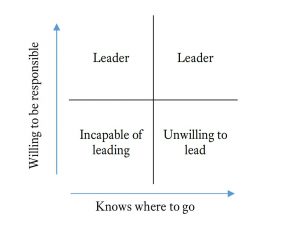Shortly after I started my little hiatus a month and a half ago, my wife turned on a light bulb for me. I was trying to describe the point of what I’m trying to do, both with this blog and with my career, when she asked something like “aren’t you just saying that our business is people?”
And she’s exactly right. Our business is people.
I’ve struggled for the better part of a year to describe my first principles, ever since a colleague challenged my inability to effectively describe what I’m trying to do here. This is it: our business is people.
I advance this principle in direct opposition to the idea that business is “carried on primarily for the profit of the stockholders.” I know that this makes me different from many of my fellow capitalists, who are steeped in the modern American interpretation of capitalism that followed the Michigan Supreme Court’s declaration in Dodge v Ford Motor Co. In this, I feel a lot like Arthur Brooks (president of the American Enterprise Institute), who said of his conversion to capitalism:
“I was feeling more idealistic than ever. The more I read and learned, the more I believed that everyone—poor, rich, minority, immigrant, everyone—should be able to earn their success. I realized that free enterprise could build a better, more humane world on a mass scale, so long as the United States had the moral confidence to live its own values and share them with the world.”
Like Arthur, I’m a convert. Not to capitalism, but to the idea that our participation in the free market can and should be an exercise of our moral convictions. I believe it down to my toes.
One of the most compelling aspects of this conversion is that it has helped me understand how to apply a scriptural passage that has long captivated me. In my Mormon tradition, there is a story about a prophet named Jacob. Near the end of his life, Jacob preached to his people, calling on them to live more godly lives. Right in the middle of it, he tells his people:
“Think of your brethren like unto yourselves, and be familiar with all and free with your substance, that they may be rich like unto you.
“But before ye seek for riches, seek ye for the kingdom of God.
“And after ye have obtained a hope in Christ ye shall obtain riches, if ye seek them; and ye will seek them for the intent to do good—to clothe the naked, and to feed the hungry, and to liberate the captive, and administer relief to the sick and the afflicted.”
Jacob was a humble man and a great leader. When I first read this passage as a boy, I thought it meant that I was ok to chase my dream of becoming fabulously wealthy. I just had to figure out that whole “kingdom of God” thing and I’d be set. I’m essentially a good person, I figured, and I’ve pretty much always wanted to do good, so I just had to keep that up and God would give me the riches. As I’ve matured I’ve realized that’s not it at all.
I’ve realized that the point of this scripture is to point us toward each other, to help us see that seeking the kingdom of God inevitably and necessarily leads us to looking out for our neighbors.
Simon Sinek captures the idea in a different way. Speaking of leaders, he explains that part of what offends us so much about the CEOs who receive such disproportionately high salaries is not so much the money that they have received, but that they have “violated the very definition of leadership. They have violated this deep-seated social contract. We know that they allowed their people to be sacrificed so they could protect their own interests, or worse, they sacrificed their people to protect their own interests. This is what offends us, not the numbers. Would anybody be offended if we gave a $150 million bonus to Gandhi?” The video is below, and the relevant portion starts at around the 7:32 mark.
[ted id=1998]
Like Arthur Brooks, I believe this is a moral issue. To say that our business is people is to make an explicitly moral argument. It stands in opposition to the moral argument that a business exists primarily for the profit of its stockholders. And like Arthur Brooks, “I hear pretty frequently that we should focus on economics and not morality. That is dead wrong and a false choice besides. Economic issues are moral issues. Americans are not materialists. The vast majority of Americans want public policies that are not merely economically efficient, but also morally just.”
We can build business that is both morally just and economically efficient. It starts by aiming at the right goal: people.
